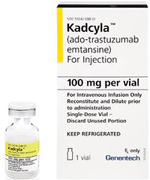Back in August, the National Institute of Health and Care Excellence (NICE) said it would take the reins of England's Cancer Drugs Fund (CDF) in light of the fund's continued financial problems. Now that time has come, and the industry is not pleased, saying the move will prevent many patients from benefiting from new cancer drugs.
NHS England, under which NICE operates, has approved proposed changes to the CDF after 12 weeks of deliberation. The reforms make the CDF a managed access fund starting in July 2016, giving NICE the ability to make "yes," "no," or "maybe" decisions about funding cancer meds, Pharmafile reports. The CDF stopped approving new meds in May 2015.
Under the new system, drugs that get a "yes" from NICE will be made available to patients. Meds that receive a "maybe" will be considered for CDF funding while NICE during a two-year period collects real-world data about the drug's efficacy.
Unlike the old fund, the new fund will have a fixed budget of £340 million ($474 million). The CDF has struggled with financial problems almost since its inception, and British officials in 2014 said that the fund would exceed its £200 million annual budget by £100 million by the end of its 2014/2015 fiscal year.
 To get the CDF out of that mess, the government shelled out an additional £160 million to make up the difference and granted the CDF power to shorten its list of covered drugs. Last year, the CDF said that it would reduce its list to 62 approved indications from its original 84, sparking the ire of companies such as Roche ($RHHBY), whose next-gen breast cancer treatment Kadcyla was on the chopping block.
To get the CDF out of that mess, the government shelled out an additional £160 million to make up the difference and granted the CDF power to shorten its list of covered drugs. Last year, the CDF said that it would reduce its list to 62 approved indications from its original 84, sparking the ire of companies such as Roche ($RHHBY), whose next-gen breast cancer treatment Kadcyla was on the chopping block.
In September, Roche CEO Severin Schwan said the fund's decision to throw treatments off its covered list was "stupid" and "completely arbitrary." "It's stupid from a cost point of view," Schwan said at the time. "How the hell can you ignore all these benefits?"
Schwan could be breathing a little easier now, though. In November, the CDF and Roche struck a discount deal for Kadcyla to keep the med covered.
Still, NICE as part of the latest CDF overhaul is planning to reassess 47 drugs available through the CDF. This could lead to almost half of the meds on the list being axed if the agency does not find them cost-effective, Pharmafile points out.
Unsurprisingly, some in the industry are not pleased with NICE's decision, including Eisai, whose cancer drug Lenvima was axed from the CDF's covered list. The move creates "an utterly disgraceful situation" for patients seeking cancer meds, the company's head of global oncology Gary Hendler told The European Pharmaceutical Review.
"Time is not a luxury that these patients have. I implore NHS England to rethink the decision around access to drugs that have been licensed since May 2015 to ensure important treatments like (Lenvima) are made available to people as soon as possible," Hendler said.
 |
| ABPI's Paul Catchpole |
Critics of the CDF have argued that the fund restricts patients' access to potentially life-extending meds. And the "largely unchanged proposals" set out by NICE carry "the very real risk of significantly setting back patient access to cancer medicines, now and for the foreseeable future," the Association of the British Pharmaceutical Industry (ABPI) director Paul Catchpole said, as quoted by Pharmafile.
The way ABPI sees it, the latest reforms will make about two-thirds of the meds on the CDF's covered list unavailable to patients by the end of 2016. Patients may also have to wait longer to access new cancer meds once they're approved, Catchpole said.
"If cancer medicines go through more or less exactly the same NICE appraisal process that was in place five years ago--which necessitated the setting up of the CDF in the first place--we will largely get the same answers as before--the majority of medicines will be turned down," Catchpole said. "Turning the clock back 5 years just doesn't make sense; substantial change is needed to the way that NICE appraisers cancer medicines to prevent this."
- read the Pharmafile story
- here's the European Pharmaceutical Review article
Special Report: Top 10 best-selling cancer drugs of 2013